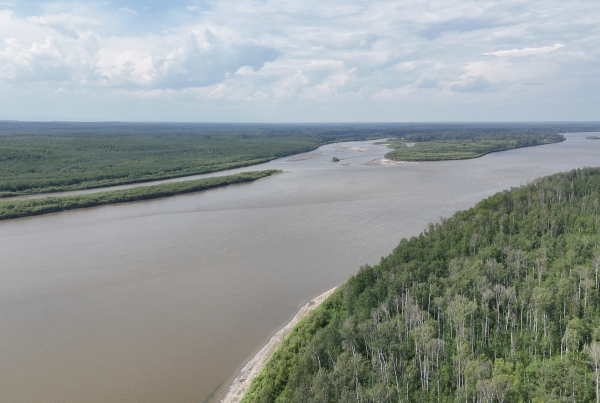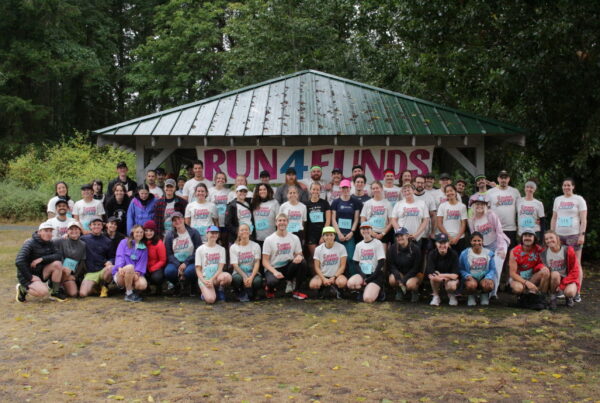As we pick our way along a cedar-lined trail near Bella Bella, B.C. elder Pauline Waterfall explains how her Heiltsuk traditions have been “passed forward” to her.
Having suffered through colonial onslaughts of genocide and residential schools, the resilience that Pauline embodies goes much further than just cultural survival. When you follow her into the forest she has a story about every medicinal plant. She greets the creatures she meets in the language of her ancestors. Like a grandmother tree at the heart of an old growth rainforest, she is carrying on relationships that are quite literally tens of thousands of years old.
The wisdom that Indigenous elders carry is complex, but the way those teachings are put into practice can also be summed up in one word: Gvi’las.
It’s a Heiltsuk word meaning ‘law’. At its essence, gvi’las embodies the values that are considered most worth passing forward. Just as grandmother trees give rise to new life, at its best, law can also nourish new generations of possibility.

Last year, working with three law students from the University of Victoria through Pro Bono Students Canada, RAVEN set out to assess how the legal challenges we’ve supported have gone on to strengthen other Nation’s cases.
What we found was surprising, and gratifying.
We discovered that we, too, are becoming part of lineages of law. As you might have seen in our Victory report, RAVEN-supported cases have been cited in judicial decisions more than 250 times over the past decade.
- The decision that led to Yukon First Nations’ victory in protecting the Peel Watershed has gone on to influence judicial interpretations of modern treaties, gradually shifting the focus to one of reconciliation and ongoing relationship.
- The Pull Together to Stop Enbridge campaign judgement has been referenced as clarifying the standard required for the Crown’s duty to consult, emphasising the importance of ongoing consultation and the fact that “mere notetaking” will not suffice.
- RAVEN’s work supporting legal challenges to Site C Dam helped to clarify the process for assessing whether the Crown’s consultation and accommodation has been sufficient, raising the standard for the duty to consult.
- Through The People v. Trans Mountain, RAVEN supported a number of cases which have emphasised that the duty to consult must be determined on the basis of impacts on treaty rights, not simply on environmental impacts. The case also helped clarify how the duty can be discharged through constructive two-way dialogue.
- RAVEN’s work with Beaver Lake Cree Nation resulted in a judgement which allows Indigenous Nations to raise arguments regarding the cumulative effects of development in treaty rights cases.
The Nations we support to go to court don’t always win: neither the Site C nor the TMX cases turned out the way we wanted. But the way the judgements in those cases are being applied shows that there are gains to be had by holding your ground, and taking a stand.
It’s undeniable: win or lose, our research shows that RAVEN’s work is influencing the development of the law, and is advancing Crown-Indigenous relationships.
Behind each of these cases are elders, whose testimony has been used in court to prove the unbroken governance responsibilities held by Indigenous Peoples. Elder’s stories instruct, delight, warn, and guide, but they also validate assertions that Indigenous Peoples have stewarded these lands and waters since time immemorial.
Because of the teachings kept alive by the likes of Pauline Waterfall, RAVEN has been able to contribute to establishing legal precedents that are, like a huckleberry sprung from an ancient cedar stump, part of a process of repair. We are deeply grateful to Indigenous knowledge keepers, and to you for the part you play by listening, learning, and lending a hand in all the ways you do.
Thank you for being part of our RAVEN story.






